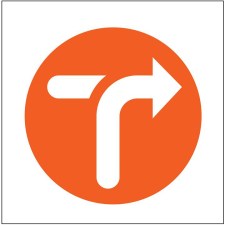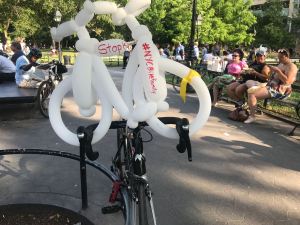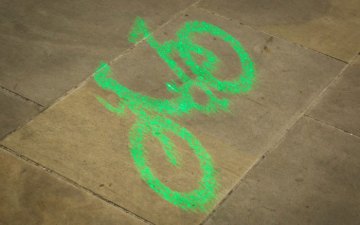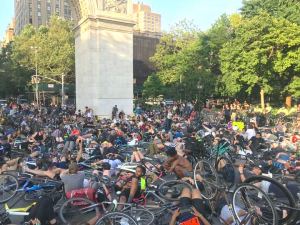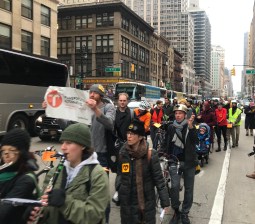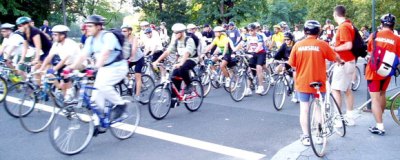TransAlt Leader: I Don’t Bike To Work Because I Don’t Feel Safe Out There
An incomplete bike network is why people don't ride, says Ellen McDermott.
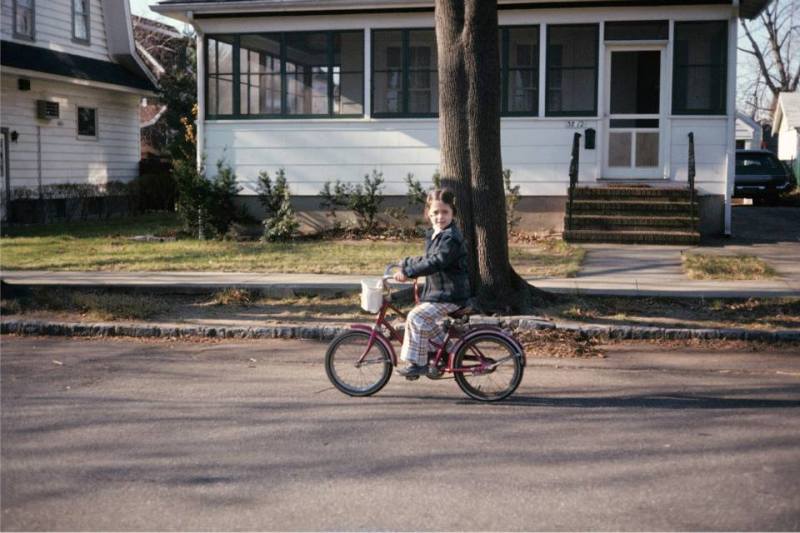

I’m a full-time safe streets advocate, and I almost never bike to work.
I’ve worked at Transportation Alternatives, where I’m now serving as interim co-executive director, for more than four years. I grew up riding around Queens with my dad. I live in Midtown Manhattan, four miles from TransAlt’s office in the Financial District. That’s a perfect length for a bike commute, and I love to ride. So why don’t I?
The easiest route includes a three-mile stretch along the East River Greenway, which I access at 20th Street, about ¾-mile south of where I live. In order to get there, I walk my bike several blocks on the sidewalk down Lexington Ave to 32nd St, then ride east to the protected bike lane on Second Avenue. The ride on 32nd is a busy couple of blocks, but manageable with a lot of head turns and watching for people opening car doors.
Once I’m on Second Avenue, the ride is fantastic — in between left-turn corners, that is. Many of those have “mixing zones,” meaning spots where cars and trucks can turn into your path. Some of the intersections have a split phase, where bikes can proceed while left-turning cars have to wait. Others, inexplicably, don’t.
Another eastward turn on 20th Street and we’re almost at the greenway. There’s a striped bike lane on 20th between First Avenue and Avenue C, followed by complicated intersection across two-way traffic — and then voilà! Freedom! Once you get past the (insanely narrow) section adjacent to the Con Ed facility at 13th Street, the ride is awesome. The path is wide, the East River and three of its magnificent bridges are in view, and typically the only four-wheeled vehicles present are Parks Department golf carts and battery-powered skateboards … for about a mile.
Then the path narrows and weaves through some Department of Sanitation parking lots — keep a look out for inattentive truck drivers here — and then the final stretch under the FDR viaduct into the Financial District. When I arrive, I’m often shaky, but from vigilance-induced adrenaline instead of the actual exercise.
I am not alone. TransAlt’s own research, the BikeNYC 2020 report, found that more than two-thirds of less frequent riders said that the most important thing the city could do to get them riding more would be to build more protected bike lanes. More than 90 percent of people who used to ride said that would get them back on their bikes. Men still outnumber women two-to-one as regular bike riders. Among my colleagues, I have many female “roll” models, who inspire me. The women who don’t ride cite a few reasons: street harassment; NYPD bike stings; not wanting to arrive at their destination covered in sweat—a condition particularly frowned upon for women — but mostly it’s because they don’t feel safe riding in mixed traffic with multi-ton vehicles.
So what can we do? We need to pass congestion pricing this year in Albany. Once we do, we must invest the “spatial dividend” we get from removing cars from the streets in wider sidewalks, shorter crosswalks, dedicated bus lanes (with camera enforcement, so they remain that way), and yes, many more miles of wide and protected bike lanes. And not just in Manhattan: “Boulevards of Death” like Flatbush Avenue in Brooklyn and Northern Boulevard in Queens would benefit from a bike-and-pedestrian-centric redesign. Congestion pricing — which, yes, can help fix the subway — represents our best chance to make our streets radically safer and expand the protected bike lane network in a sweeping way.
If you’re not a confident rider, there are many bike organizations where you can find fellowship and advice, like WE Bike NYC, Black Girls Do Bike, and the Five Borough Bike Club. If you’re already a regular cyclist, you could do worse than follow my colleague Chelsea Yamada’s lead—she has offered to swing by my house to coach me on the ride to work. The Queens activists who planned last year’s inaugural Women’s Ride (including my TransAlt colleague Claudia Corcino) are meeting soon to plan a ride for this year. Maybe you and I can join them.
Ellen McDermott is the interim co-executive director of Transportation Alternatives. Follow her @HeyNell on Twitter.
